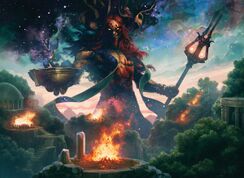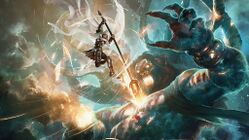Xenagos: Difference between revisions
>NikeOdinson No edit summary |
>NikeOdinson |
||
| Line 25: | Line 25: | ||
Like the rest of his kind, Xenagos led the life of a hedonist, reveling in a carefree life of pleasure without inhibitions. At some point, this lifestyle led to his ascension, his spark igniting during the Bakkeia.<ref>{{DailyRef|feature/planeswalkers-guide-theros-part-3-2013-09-04|Planeswalker's Guide to Theros, Part 3|The Magic Creative Team|September 04, 2013}}</ref> Xenagos took advantage of his newfound status and perspective, engaging in revelries elsewhere in the Multiverse and enjoying the new pleasures available to him, but soon he was aware of a grim reality: that he, ultimately, was utterly insignificant in the grand scheme of things, and that the gods' reach was meaningless outside of Theros. Following the trauma of this revelation, and disillusioned with the meaningless hedonism, the satyr became progressively more ambitious. | Like the rest of his kind, Xenagos led the life of a hedonist, reveling in a carefree life of pleasure without inhibitions. At some point, this lifestyle led to his ascension, his spark igniting during the Bakkeia.<ref>{{DailyRef|feature/planeswalkers-guide-theros-part-3-2013-09-04|Planeswalker's Guide to Theros, Part 3|The Magic Creative Team|September 04, 2013}}</ref> Xenagos took advantage of his newfound status and perspective, engaging in revelries elsewhere in the Multiverse and enjoying the new pleasures available to him, but soon he was aware of a grim reality: that he, ultimately, was utterly insignificant in the grand scheme of things, and that the gods' reach was meaningless outside of Theros. Following the trauma of this revelation, and disillusioned with the meaningless hedonism, the satyr became progressively more ambitious. | ||
[[File:Xenagos-God-of-Revels.jpg|left|thumb|244x244px|God of Revels.]] | |||
===Return to Theros=== | ===Return to Theros=== | ||
Sometime later, Xenagos returned to his birthplane, finding his old hedonistic lifestyle exceedingly dull and the gods to be a farce in which he was no longer willing to participate.<ref>{{PWBio|Xenagos|accessdate=October 02, 2013}}</ref> His ambitions had evolved into a desire for outright godhood, to join or replace the pantheon of Theros, and so he began gathering his forces of eldritch, otherworldly monsters to attack the poleis of [[Meletis]], [[Akros]], and [[Setessa]]. These attacks became so severe that the gods themselves began to go blind, cut off from their oracles. This drove them into a panic which escalated as they blamed the others of their kind for the transgression. Only [[Nylea]] seemed to be aware of the threat he played, but with his otherworldly magic, none of the gods could truly stop him. | Sometime later, Xenagos returned to his birthplane, finding his old hedonistic lifestyle exceedingly dull and the gods to be a farce in which he was no longer willing to participate.<ref>{{PWBio|Xenagos|accessdate=October 02, 2013}}</ref> His ambitions had evolved into a desire for outright godhood, to join or replace the pantheon of Theros, and so he began gathering his forces of eldritch, otherworldly monsters to attack the poleis of [[Meletis]], [[Akros]], and [[Setessa]]. These attacks became so severe that the gods themselves began to go blind, cut off from their oracles. This drove them into a panic which escalated as they blamed the others of their kind for the transgression. Only [[Nylea]] seemed to be aware of the threat he played, but with his otherworldly magic, none of the gods could truly stop him. | ||
Revision as of 17:12, 18 November 2020
| Xenagos | |
|---|---|
|
[[File:{{#setmainimage:Xenagos-The-Reveler-Art.jpg}}|250px]] | |
| Details | |
| Race | Satyr Planeswalker, (later God) |
| Birthplace | Setessa, Theros |
| Lifetime | unknown-~4559 AR |
| Colors | |
|
Currently: | |
Xenagos was a satyr planeswalker from Theros. He used to be the lord of Skola Valley and was known at large as "King Stranger".
Appearance and characteristics
He appeared as a muscular young satyr with long brown hair and beard, brown fur down his hooves, two pairs of horns. as well as markings along his body with what appears to be red war paint.
Xenagos was centered in green and red mana.
History
Xenagos's history of violence and ego began before he was even born, slaying his twin sister while they were each still in the womb. In time, his mother, Raissa, would give birth, knowing that Xenagos would bear a fate destined to be something special. Unlike the others of her kind, she stayed and attempted to raise the child that she knew was fated for something great.
It was a terrible decision.
Xenagos displayed a wanton disregard for life, killing another child and leading Raissa to flee with her child from Setessa. It did not stop there though. At six, he began to attempt to murder his own mother. He seemed impressed by her ability to overcome his repeated attempts on her life, but all Raissa desired were answers. The answers she got were confusing and terrifying, as she saw visions of her son rise to challenge the gods themselves.
The Rise of King Stranger
Like the rest of his kind, Xenagos led the life of a hedonist, reveling in a carefree life of pleasure without inhibitions. At some point, this lifestyle led to his ascension, his spark igniting during the Bakkeia.[1] Xenagos took advantage of his newfound status and perspective, engaging in revelries elsewhere in the Multiverse and enjoying the new pleasures available to him, but soon he was aware of a grim reality: that he, ultimately, was utterly insignificant in the grand scheme of things, and that the gods' reach was meaningless outside of Theros. Following the trauma of this revelation, and disillusioned with the meaningless hedonism, the satyr became progressively more ambitious.

Return to Theros
Sometime later, Xenagos returned to his birthplane, finding his old hedonistic lifestyle exceedingly dull and the gods to be a farce in which he was no longer willing to participate.[2] His ambitions had evolved into a desire for outright godhood, to join or replace the pantheon of Theros, and so he began gathering his forces of eldritch, otherworldly monsters to attack the poleis of Meletis, Akros, and Setessa. These attacks became so severe that the gods themselves began to go blind, cut off from their oracles. This drove them into a panic which escalated as they blamed the others of their kind for the transgression. Only Nylea seemed to be aware of the threat he played, but with his otherworldly magic, none of the gods could truly stop him.
In circumstances largely under mystery, he gained knowledge that the Gods power stemmed from the devotion of their followers. Gaining enough devoted followers, he managed to ascend to godhood. This occurred during a minotaur siege at Akros, battled off by armies led by Elspeth. The victory celebration was the final ingredient to Xenagos' divine ascension, and in the ensuing turmoil, the Sun god's champion was ironically scapegoated for this, resulting in her exile to the wilderness. Xenagos held the position of the god of the revels, furthering the chaos and distrust of the established pantheon.[3] Heliod was particularly offended by his ascension and sought to destroy the satyr, whom he refers to as "the usurper". He planned to punish all of mortal-kind for the actions of the new god.
Fall from Nyx

Xenagos had accomplished what he had desired: obtaining a place in the pantheon. However, he could not sustain his godly form by himself; he gathered a large array of Nyxborn creatures, using them to keep his position. Capturing the Nyxborn caused Theros's sky to darken, as chaos spread across the plane. His stay in Nyx would not be a long one, though. Only a couple days after his rise, Elspeth and her friend Ajani arrived in Nyx to set Theros right again. After a difficult battle, Xenagos managed to knock Elspeth down, planning on taking her weapon, Godsend, to keep his position firm. However, Elspeth managed to throw the spear into Xenagos's chest, causing the arrowhead, which Nylea had shot into Xenagos before his ascension, to explode, tearing Xenagos's organs into shreds. As Xenagos died in Nyx, he is not even in the Underworld and as such, he is truly gone.[4]
Trivia
- The character of Xenagos is inspired by the Greek satyr god Pan, and Dionysus, the Greek god of wine, ritual madness, and ecstasy.
- Xenagos was originally designed with a goat head, but this was scrapped due to him looking "too demonic and inhuman".[5]
Planeswalkers met
Planes visited
Story appearances
| Title | Author | Publishing date | Set | Setting (plane) | Featuring |
|---|---|---|---|---|---|
| Thank the Gods | Clayton Kroh | 2014-04-30 | Journey into Nyx | Theros | Xenagos |
In-game references
- Represented in:
- Associated cards:
- Depicted in:
- Quoted or referred to:
Gallery
-
Xenagos key art
-
Reaching to divinity
-
The god
Sources
- ↑ The Magic Creative Team (September 04, 2013). "Planeswalker's Guide to Theros, Part 3". magicthegathering.com. Wizards of the Coast.
- ↑ Xenagos. Planeswalker Biography. Wizards of the Coast. Retrieved on October 02, 2013.
- ↑ The Magic Creative Team (January 08, 2014). "Planeswalker's Guide to Born of the Gods". magicthegathering.com. Wizards of the Coast.
- ↑ Mark Rosewater (March 11, 2019). "Where It's At". magicthegathering.com. Wizards of the Coast.
- ↑ Inside R&D: Theros, Part 3 (Video). Magic: The Gathering. YouTube (October 12, 2013). Retrieved on October 26, 2013.


